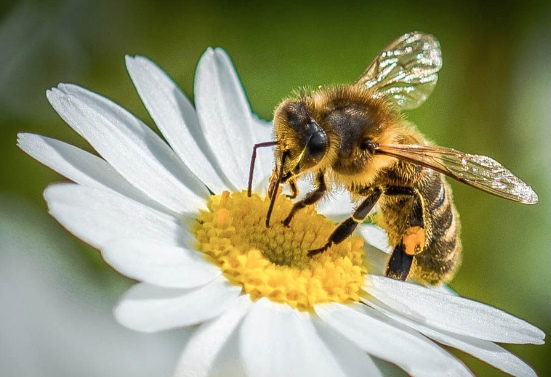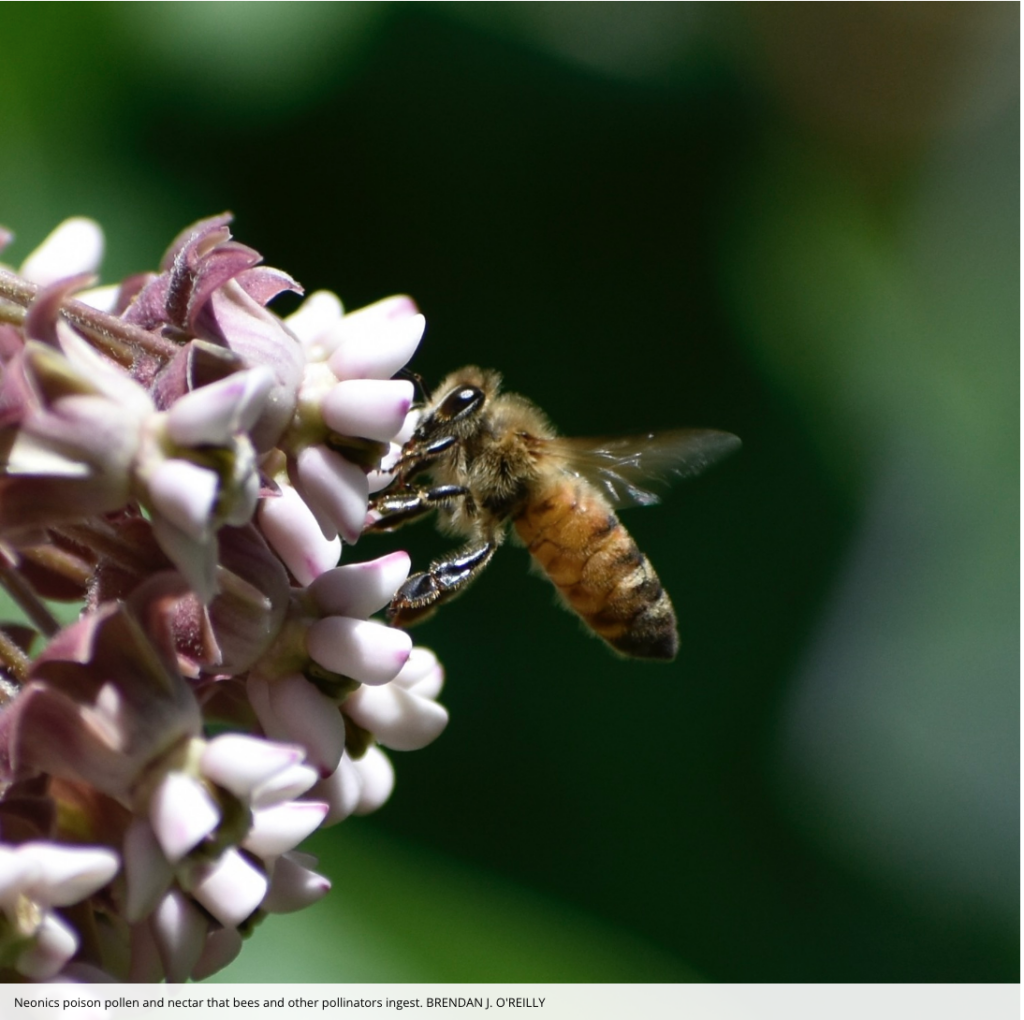
The March 14th issue of the Express-News Group edition for 27 East –
The Accidental Beekeeper: “New state legislation takes popular pesticide off shelves” The new law will phase out most neonics by 2027.
This is great news for not only bees but also human beings. Neonicotinoid products (often referred to as “neonics”) are used in farming, creating toxic leaves, stems, pollen, nectar, and fruit. Landscapers use products containing toxic chemicals to repel insects that can damage lawns, ornamental plantings, bushes, and specimen trees. Even tick and flea collars (Seresto brand) for dogs contains the pesticide Imidacloprid. *In 2023 the EPA issued an order that the collars have a warning label.)
Unfortunately, the chemicals do not dissipate but remain active in our soil- plumes carry the toxins to our wells and contaminate our drinking water. Researchers have discovered that exposure to neonicotinoids can cause serious harm to both humans and mammals, including malformations of the brain and heart, and lower testosterone levels, among other illnesses.
Neonicotinoids (sometimes shortened to neonics) are a class of neuro-active insecticides chemically similar to nicotine developed by scientists at Shell and Bayer in the 1980s.
Neonicotinoids are among the widest-used insecticides in crop protection.They are also widely employed for veterinary purposes including tick and flea control. The first generation of neonicotinoids includes acetamiprid, clothianidin,dinotefuran, imidacloprid, nitenpyram, nithiazine, thiacloprid, and thiamethoxam. The more recently-marketed generation of neonicotinoids includes cycloxaprid, imidaclothiz, paichongding, sulfoxaflor, guadipyr, and flupyradifurone. Imidacloprid has been the most widely used insecticide in the world from 1999 through at least 2018.
Because they affect the central nervous system of insects, neonicotinoids kill or deleteriously affect a wide variety of both target and non-target insects. They are often applied to seeds before planting as a prophylactic treatment against herbivorous insects. Neonicotinoids are water-soluble, so when the seed sprouts and grows, the developing plant absorbs the pesticide into its tissues as it takes in water. Neonicotinoids can also be applied to the soil directly. Once absorbed, neonicotinoids become present throughout the plant, including in its leaves, flowers, nectar, and pollen.
Neonicotinoid use has been linked to adverse ecological effects, including risks to many non-target organisms, and specifically on bees and pollinators. A 2018 review by the European Food Safety Authority. (EFSA) concluded that most uses of neonicotinoid pesticides represent a risk to wild bees and honeybees. In 2022 the United States Environmental Protection Agency (EPA) concluded that neonicotinoids are likely to adversely affect the majority of federally listed endangered or threatened species and of critical habitats.
Neonicotinoids widely contaminate wetlands, streams, and rivers, and due to their widespread use, pollinating insects are chronically exposed to them. Sublethal effects from chronic low-level exposure to neonicotinoids in the environment are thought to be more common in bees than directly lethal effects. These effects upon bees include difficulty navigating, learning, and foraging, suppressed immune response, lower sperm viability, shortened lifespans of queens, and reduced numbers of new queens produced.
In 2013, the European Union and some neighboring countries restricted the use of certain neonicotinoids. In 2018, the EU banned the three main neonicotinoids (clothianidin, imidacloprid, and thiamethoxam) for all outdoor uses.
Several U.S. states have restricted neonicotinoids out of concern for pollinators and bees.

Governor Kathy Hochul signed the Birds and Bees Protection Act into law late last year.
New York State Assemblyman Fred Thiele is a member of the NYS environmental and conservation committee as well as the co-sponsor of the bill. He was key to this bill as both the co-sponsor and advocate for the protection of clean water quality. He made known that agriculture and water quality were serious issues for the East End and while pollinators health and survival is essential, protecting water quality for residents topped the list for reason to ban neonicotinoids. “Most of our economy on the East End depends on the environment,” Assemblyman Thiele said.
The Birds and Bees Protection Act will gradually phase out neonics as farmers, landscapers, homeowners, and the community in general learn about how deleterious they are to our environment- water quality, economy, and human and mammal health.
On September 14, 2021, the East Hampton Town Trustees sent a letter in support of a ban on neonicotinoid products to former Assemblyman Steve Englebright, who at the time served as the Chair of the Committee of Environmental Conservation. Click on the tab below to read the correspondence.
Read the full article from The Express News Group: